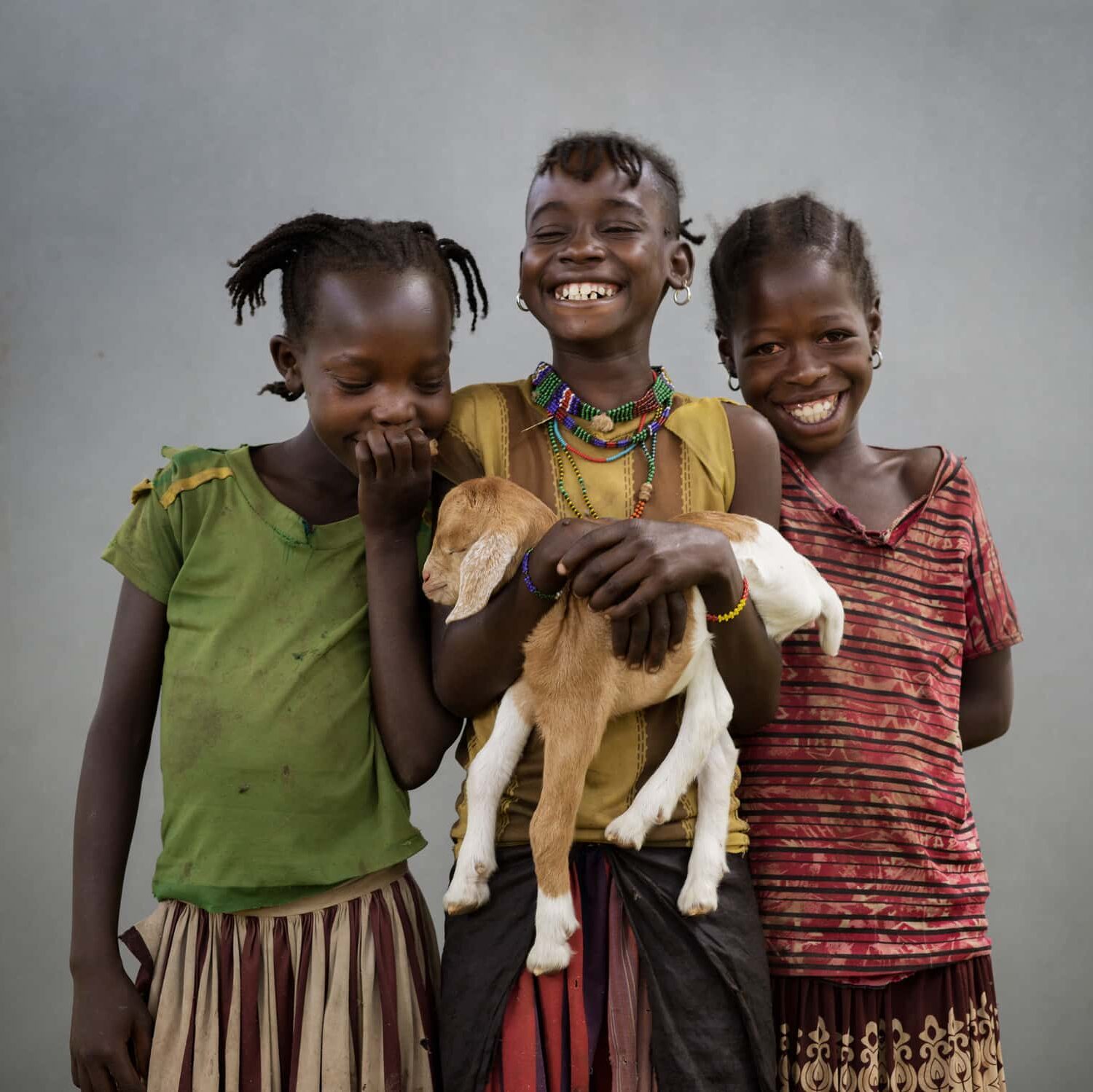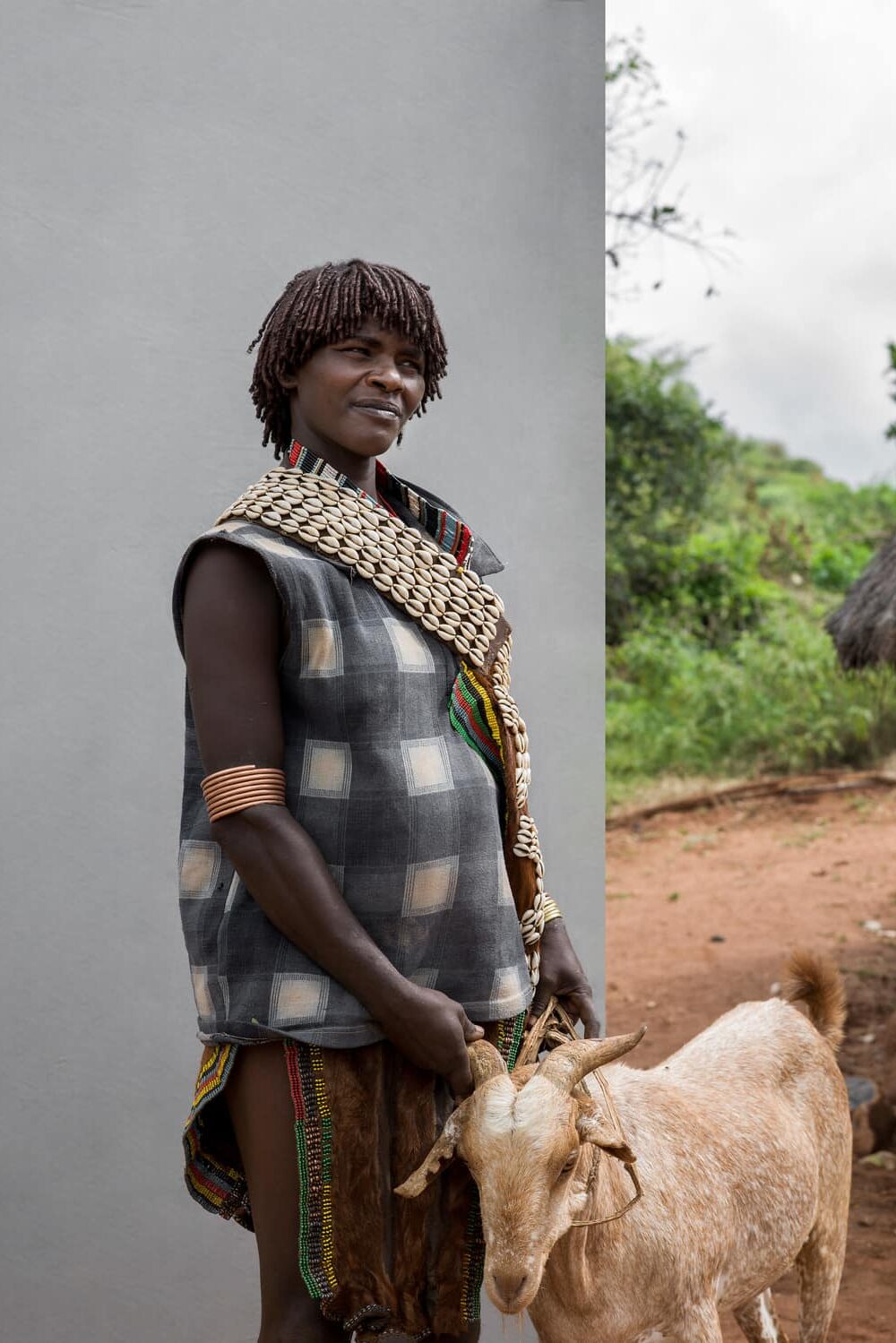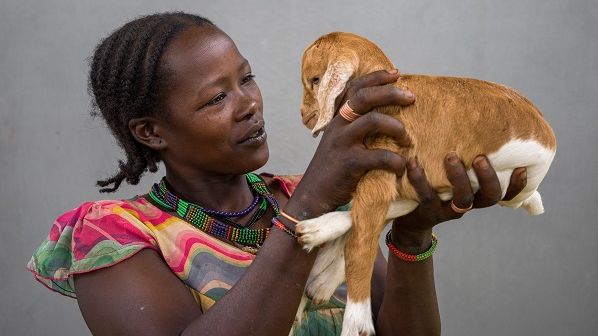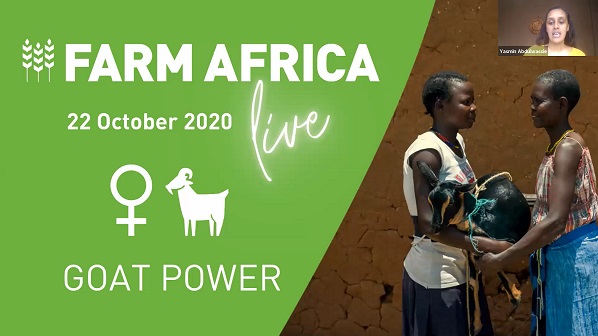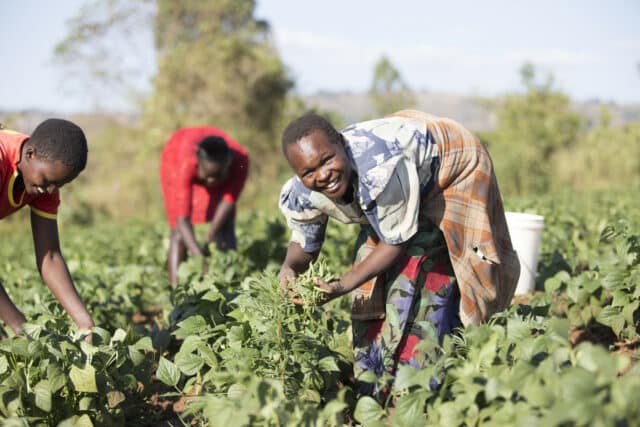Specific expertise
Goat rearing
Goats are low maintenance and adaptable animals that can help farmers in eastern Africa escape poverty, build resilience to climate change and improve nutrition.
Low maintenance and adaptable, goats can support farmers in a range of ways.
From helping smallholder farmers to escape poverty and build resilience to climate change, to empowering women in rural communities and boosting families’ health and nutrition, goats are fantastic animals that can transform lives in eastern Africa.
Financial security
Goat rearing provides a reliable source of income year-round for farmers, who can sell goats’ milk, meat, cheese, butter and hides easily and quickly for cash to meet their families’ needs.
Then, as goats breed, farmers can sell the kids and see their incomes grow.
Nutrition
Goats’ milk can provide most of the essential nutrients and energy required by growing children.
Food insecurity is a major challenge in many rural communities in eastern Africa, which can lead to malnutrition and stunting in children, so access to a rich source of protein such as goats’ milk can improve families’ diets.

Supporting women to rear goats
Goats are an excellent livestock option for women. Small and relatively low-maintenance, goats can be easily cared for close to home for those juggling domestic responsibilities.
They do not require much up-front investment or land compared to larger animals, making them suitable for pastoralist women, who often have less access to land and financial resources than men.
The income received from rearing goats ensures female farmers can afford various expenses such as their children’s school fees and medical costs.
Farm Africa helps to establish Women’s Livestock Groups, through which we provide training in goat rearing and fodder and rangeland management to women.
We improve women’s access to livestock by setting up revolving goat schemes, which require each woman who receives two goats from Farm Africa to give two does (female goats) to another vulnerable woman once her herd grows, creating a cycle of improved prosperity.

Climate resilient
The climate in eastern Africa can be harsh and unpredictable and it’s sometimes difficult for farmers to keep cattle healthy or grow enough crops to feed their children.
But goats are tough and hardy animals that can help build farmers’ resilience to climate change:
- Goats are well-adapted to arid landscapes and can thrive in variable temperatures during food and water shortages.
- Goats can help farmers grow crops as their manure can be used as fertiliser.
- Goats have short reproduction cycles of only five months and often produce twins, allowing for plenty of opportunity for breeding, and particularly rebuilding population numbers if they drop after a drought.
Community animal health workers
Farm Africa provides support and training to community animal health workers in eastern Africa, who provide essential veterinary services to pastoral communities, such as vaccinating and spraying goats to keep parasites at bay.
They play a crucial role in reducing livestock mortality and maintaining healthy and highly productive herds.
Safeguarding the health of goats means safeguarding female farmers’ ability to have milk for their children and manure for growing crops.
And healthy goats mean farmers can earn an income, lift their families out of poverty and help future generations to grow and thrive.

Resources
Country
Ethiopia
Key focus areas
Empower women
Increase incomes
Revolving Goat Fund
Farm Africa’s Livestock for Livelihoods project helped Ugandan and Ethiopian pastoralist women set up sustainable, small-scale goat-rearing enterprises. This four-page booklet outlines how Farm Africa set up a revolving goat scheme across South Omo and Karamoja. The scheme required each woman who received does (female goats) from Farm Africa to give does to another vulnerable woman once her herd had grown, creating a cycle of improved prosperity.
Download (799.73kb)
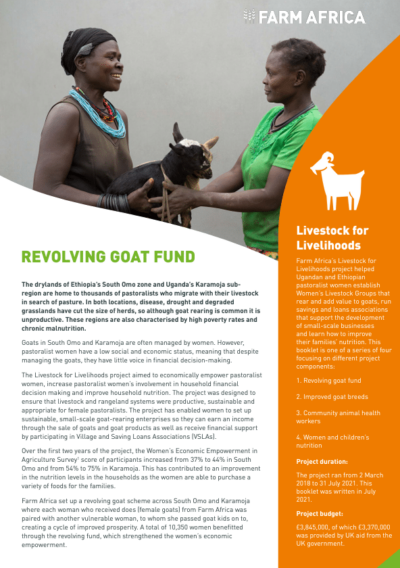
Country
Ethiopia
Key focus areas
Empower women
Increase incomes
Country
Ethiopia
Key focus areas
Increase food security and nutrition
Improved goat breeds
Farm Africa’s Livestock for Livelihoods project helped Ugandan and Ethiopian pastoralist women set up sustainable, small-scale goat-rearing enterprises. This four-page booklet outlines how the project created and strengthened a network of community animal health workers (CAHWs) linked to agro-input dealers to enhance pastoralists’ access to quality animal health services.
Download (847.17kb)
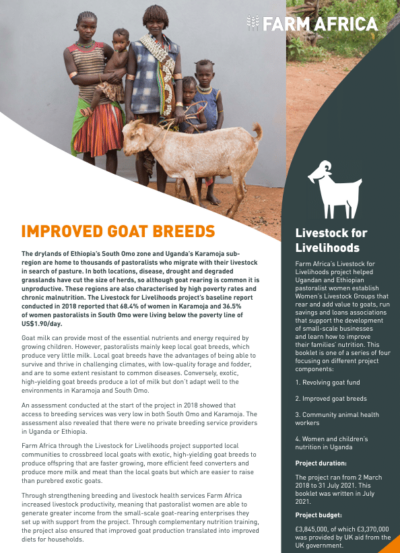
Country
Ethiopia
Key focus areas
Increase food security and nutrition
Country
Ethiopia
Key focus areas
Empower women
Increase food security and nutrition
Increase incomes
Community Animal Health Workers
Farm Africa’s Livestock for Livelihoods project helped Ugandan and Ethiopian pastoralist women set up sustainable, small-scale goat-rearing enterprises. This four-page booklet outlines how the project created and strengthened a network of community animal health workers (CAHWs) linked to agro-input dealers to enhance pastoralists’ access to quality animal health services.
Download (860.17kb)
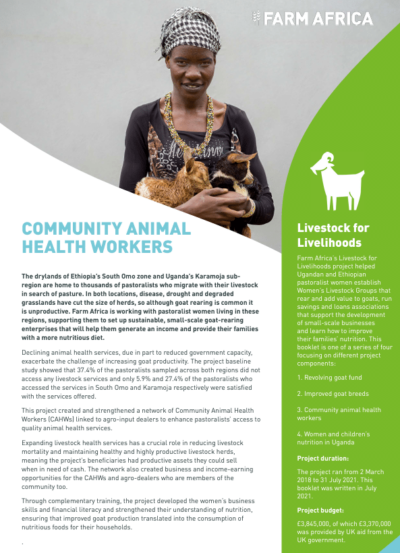
Country
Ethiopia
Key focus areas
Empower women
Increase food security and nutrition
Increase incomes
Country
Uganda
Key focus areas
Empower women
Increase food security and nutrition
Women and children’s nutrition in Uganda
Farm Africa’s Livestock for Livelihoods project helped Ugandan and Ethiopian pastoralist women set up sustainable, small-scale goat-rearing enterprises. This four-page booklet outlines how the project helped to improve the nutrition of women and young children in Karamoja, Uganda. Wasting in young children (0-59 months), infant and young child minimum dietary (IYCF-MDD) score, and Minimum Dietary Diversity for women (MDD-W) all showed positive trends and improvement during the project life cycle.
Download (1.19mb)
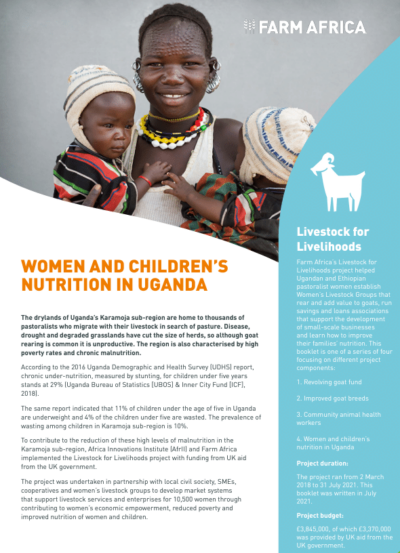
Country
Uganda
Key focus areas
Empower women
Increase food security and nutrition
Country
Ethiopia
Key focus areas
Empower women
Increase food security and nutrition
Impact of increased women’s incomes on nutrition
Farm Africa’s Livestock for Livelihoods project helped Ugandan and Ethiopian pastoralist women set up sustainable, small-scale goat-rearing enterprises. This booklet highlights how Farm Africa improved 10,000 women’s access to credit facilities and incomes by adding value to livestock products and opening up improved opportunities for sales.
Download (2.29mb)
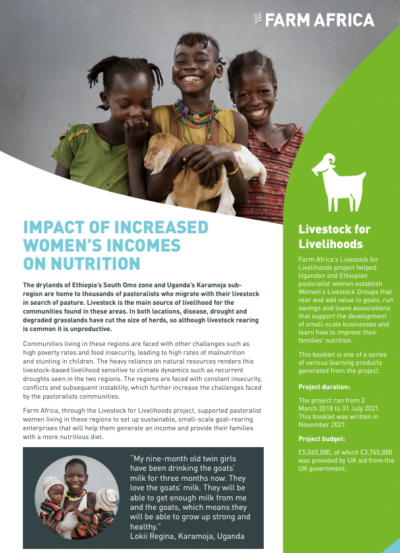
Country
Ethiopia
Key focus areas
Empower women
Increase food security and nutrition
Country
Ethiopia
Key focus areas
Empower women
Increase food security and nutrition
Increase incomes
Household socioeconomic status and women and children’s dietary diversity
Farm Africa’s Livestock for Livelihoods project helped Ugandan and Ethiopian pastoralist women set up sustainable, small-scale goat-rearing enterprises. This booklet examines the factors that improve dietary diversity in women and children, including women’s economic empowerment, production of food crops and the size of livestock herds.
Download (7.2mb)
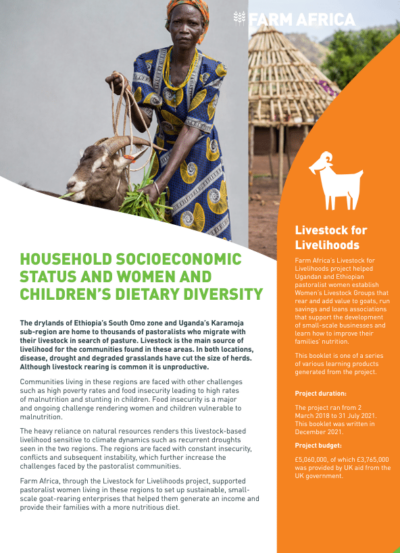
Country
Ethiopia
Key focus areas
Empower women
Increase food security and nutrition
Increase incomes
Country
Ethiopia
Key focus areas
Empower women
Increase food security and nutrition
Increase incomes
Goat husbandry by pastoralist communities
Farm Africa’s Livestock for Livelihoods project helped Ugandan and Ethiopian pastoralist women set up sustainable, small-scale goat-rearing enterprises. This booklet examines the factors affecting the adoption of good goat husbandry practices such as the provision of housing for goats, improved feeding practices, fodder production and using services from animal health workers.
Download (2.1mb)
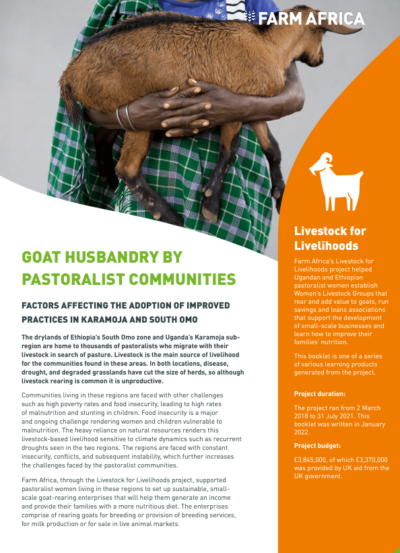
Country
Ethiopia
Key focus areas
Empower women
Increase food security and nutrition
Increase incomes
